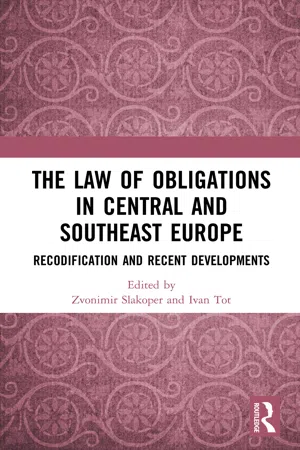
The Law of Obligations in Central and Southeast Europe
Recodification and Recent Developments
- 248 pages
- English
- ePUB (mobile friendly)
- Available on iOS & Android
The Law of Obligations in Central and Southeast Europe
Recodification and Recent Developments
About This Book
The Law of Obligations in Central and Southeast Europe examines the new codifications, reforms, and other recent developments in Central and Southeast Europe which have significantly modernized the law of obligations in the last two decades, focusing particularly on the legal systems of Poland, Czech Republic, Slovak Republic, Hungary, Slovenia, Croatia, Serbia, and Turkey.
With chapters authored by prominent academics and promising young legal scholars, this book discusses the results of the modernizations and describes the legislative reforms of the law of obligations that are underway or are discussed and advocated for in the countries of Central and Southeast Europe. Divergences of the new civil codes and other legislative acts from earlier legal solutions are identified and the rationale behind these departures is analysed, as well as the introduction of the new legal institutes in the law of obligations in these parts of the world. The Introduction provides a concise country-by-country overview of the recodification, modernization, and reform of the law of obligations in Central and Southeast Europe. In Part I, chapters discuss the process of recodification in the Slovak Republic, Czech Republic, Poland, and Hungary, with focus on the main novelties in their contract and tort law. The chapters in Part II then discuss several, more specific legal institutes of the law of obligations, and other recent developments and contemporary challenges to the law of obligations in the Czech Republic, Slovenia, Croatia, Serbia, and Turkey.
This book is of interest to legal scholars in the field of private law, as well as to students, practitioners, members of law reform bodies, and civil servants in Central and Southeast Europe, and beyond.
Frequently asked questions
1
Recodification and recent developments in the law of obligations in Central and Southeast Europe
1 Introduction
2 The law of obligations in the Baltic states
2.1 Estonia
2.2 Latvia
Table of contents
- Cover
- Half Title
- Title Page
- Copyright Page
- Contents
- Foreword
- Preface
- List of abbreviations
- List of contributors
- 1 Recodification and recent developments in the law of obligations in Central and Southeast Europe
- PART I Recodification of the law of obligations in Central and Southeast Europe
- PART II Specific institutes and recent developments in the law of obligations in Central and Southeast Europe
- Index